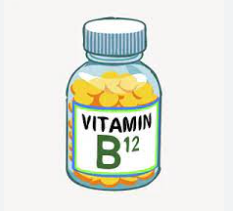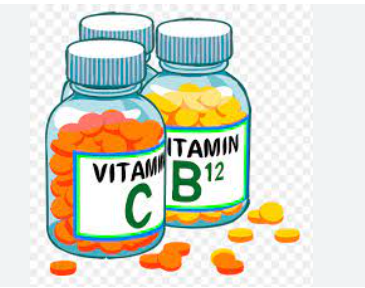Vitamin B12:
Exploring the Vitality of Vitamin B12
Vitamin B12, also known as cobalamin, is a water-soluble vitamin that plays a crucial role in various bodily functions, including nerve function, DNA synthesis, and red blood cell formation. In this article, we will delve into the importance of vitamin B12, its sources, benefits, and potential risks of deficiency.
Importance of Vitamin B12
Vitamin B12 is essential for maintaining healthy nerve cells and supporting neurological function. It is also involved in the metabolism of amino acids and fatty acids, making it vital for energy production and the synthesis of DNA and RNA.
Discovery of Vitamin B12
The discovery of vitamin B12 is a testament to the relentless pursuit of scientific inquiry. In the early 20th century, scientists were exploring the intricate complexities of nutrition and its impact on health. The breakthrough came in the 1940s when researchers identified a substance that could cure pernicious anemia, a debilitating condition characterized by fatigue and weakness.
Two scientists, George Richards Minot and William Parry Murphy, were awarded the Nobel Prize in Physiology or Medicine in 1934 for their pioneering work on the treatment of pernicious anemia using liver extract, which was later found to contain vitamin B12. This discovery paved the way for further research into the role of vitamin B12 in human health and the development of effective treatments for related disorders.
Brands Offering Vitamin B12 Supplements and Fortified Foods
1. Nature Made
Nature Made is a well-established brand known for its commitment to providing high-quality dietary supplements. They offer a range of vitamin B12 supplements, including tablets, softgels, and gummies, catering to the diverse needs of consumers. Nature Made products undergo rigorous testing to ensure purity, potency, and safety.
2. NOW Foods
NOW Foods is a trusted name in the health and wellness industry, offering a wide selection of natural and organic products. Their vitamin B12 supplements are sourced from premium ingredients and manufactured under strict quality standards. NOW Foods is dedicated to promoting health and sustainability through its products and practices.
3. Solgar
Solgar has been a leader in the nutritional supplement industry for over 70 years, providing innovative solutions for optimal health and wellness. Their vitamin B12 supplements are formulated to deliver maximum absorption and effectiveness, utilizing advanced technologies and premium ingredients. Solgar is committed to promoting lifelong health through education and empowerment.
4. Garden of Life
Garden of Life is renowned for its organic and non-GMO products made from whole foods and natural ingredients. Their vitamin B12 supplements are derived from plant-based sources, making them suitable for vegetarians and vegans. Garden of Life products are sustainably sourced and environmentally friendly, reflecting the brand's commitment to health and sustainability.
5. Fortified Foods Brands
Several food brands have recognized the importance of vitamin B12 and have fortified their products to help consumers meet their nutritional needs. These include breakfast cereals, plant-based milk alternatives, nutritional yeast, and energy bars. Fortified foods provide convenient and accessible sources of vitamin B12 for individuals with dietary restrictions or preferences.
Sources of Vitamin B12
Animal Products
Animal products are the primary dietary sources of vitamin B12. These include meat, fish, poultry, eggs, and dairy products. Consuming animal-based foods regularly ensures an adequate intake of vitamin B12 for most people.
Fortified Foods
Certain plant-based foods, such as fortified cereals, plant-based milk alternatives, and nutritional yeast, are fortified with vitamin B12. These fortified foods can be beneficial for vegetarians and vegans who may have limited access to animal-derived sources of the vitamin.
Supplements
Vitamin B12 supplements are available in various forms, including tablets, capsules, and sublingual drops. They are often recommended for individuals with dietary restrictions, malabsorption issues, or certain medical conditions that affect vitamin B12 absorption.
Benefits of Vitamin B12
Supports Nerve Health
Vitamin B12 plays a crucial role in maintaining the health of the nervous system. It helps produce myelin, a protective sheath that surrounds nerve fibers and facilitates efficient nerve impulse transmission. Adequate levels of vitamin B12 are essential for preventing nerve damage and neurological disorders.
Reduces the Risk of Anemia
Vitamin B12 is necessary for the production of red blood cells in the bone marrow. A deficiency in vitamin B12 can lead to megaloblastic anemia, characterized by enlarged and immature red blood cells. Supplementing with vitamin B12 can help alleviate symptoms of anemia and improve overall energy levels.
Supports Brain Function
Several studies have linked vitamin B12 deficiency to cognitive decline and neurodegenerative diseases, such as Alzheimer's disease and dementia. Adequate intake of vitamin B12 may help maintain cognitive function and reduce the risk of age-related cognitive impairment.
Boosts Mood and Energy Levels
Vitamin B12 plays a role in synthesizing neurotransmitters like serotonin and dopamine, which regulate mood and energy levels. Low levels of vitamin B12 have been associated with symptoms of depression and fatigue. Supplementing with vitamin B12 may help improve mood and overall well-being.
Risks of Vitamin B12 Deficiency
Pernicious Anemia
Pernicious anemia is a type of megaloblastic anemia caused by a deficiency in intrinsic factor, a protein produced by the stomach that is necessary for vitamin B12 absorption. Individuals with pernicious anemia require lifelong vitamin B12 supplementation via injections or high-dose oral supplements.
Neurological Symptoms
Severe vitamin B12 deficiency can lead to neurological symptoms, including numbness and tingling in the hands and feet, difficulty walking, memory problems, and cognitive decline. These symptoms may become irreversible if left untreated for an extended period.
Increased Risk of Cardiovascular Disease
Some research suggests that vitamin B12 deficiency may be associated with an increased risk of cardiovascular disease, possibly due to elevated levels of homocysteine, a byproduct of amino acid metabolism. Elevated homocysteine levels have been linked to inflammation and damage to blood vessels.
Complications During Pregnancy
Pregnant women with vitamin B12 deficiency are at risk of developing complications such as neural tube defects, preterm birth, and low birth weight infants. Adequate intake of vitamin B12 during pregnancy is essential for maternal and fetal health.
Conclusion
Vitamin B12 is a vital nutrient with numerous health benefits, including supporting nerve function, preventing anemia, and promoting brain health. While deficiencies are relatively rare, certain groups, such as vegetarians, vegans, older adults, and individuals with gastrointestinal disorders, may be at higher risk. Consuming a balanced diet rich in vitamin B12-containing foods or supplements can help ensure optimal health and well-being.
FAQs
1. Can vitamin B12 supplements cause side effects?
- Vitamin B12 supplements are generally safe and well-tolerated when taken as directed. However, high doses may cause mild side effects such as nausea, diarrhea, or skin rash in some individuals.
2. How often should I get my vitamin B12 levels checked?
- It's advisable to have your vitamin B12 levels checked regularly, especially if you have dietary restrictions, gastrointestinal issues, or symptoms of deficiency. Your healthcare provider can determine the appropriate frequency based on your individual needs.
3. Are there any interactions between vitamin B12 and medications?
- Vitamin B12 supplements are unlikely to interact with most medications. However, certain medications, such as proton pump inhibitors and metformin, may interfere with vitamin B12 absorption and increase the risk of deficiency. Consult with your healthcare provider if you have concerns about potential interactions.
4. Can vitamin B12 deficiency be reversed with supplements?
- In most cases, vitamin B12 deficiency can be effectively treated and reversed with vitamin B12 supplementation. However, the extent of recovery depends on the severity and duration of the deficiency, as well as individual factors such as age and underlying health conditions.
5. Are there natural alternatives to vitamin B12 supplements for vegetarians and vegans?
- While plant-based sources of vitamin B12 are limited, certain fortified foods like nutritional yeast, fortified cereals, and plant-based milk alternatives can help meet dietary needs. However, it's essential for vegetarians and vegans to monitor their vitamin B12 levels and consider supplementation if necessary.




